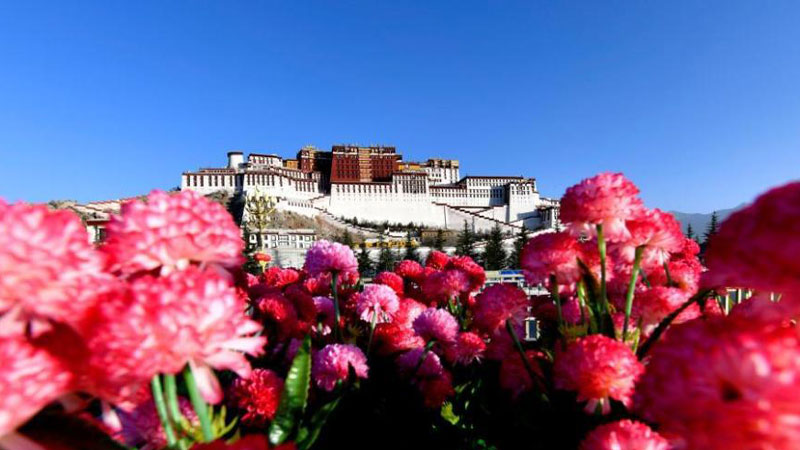China, Philippines usher in "new golden era" in relations

People visit the booth of the Philippines at the China National Convention Center during the 2022 China International Fair for Trade in Services (CIFTIS) in Beijing, capital of China, Sept. 4, 2022. (Xinhua/Qi Xiaoyi)
From tropical fruits traveling thousands of miles to Chinese dining tables to infrastructure changing the life of the Filipinos, from the Chinese language being introduced into their education to Philippine students talking with Chinese astronauts in outer space, the bond between China and the Philippines is growing closer and stronger.
BEIJING, Jan. 6 (Xinhua) -- Jomar Abdon, a sorter working for a durian processing plant in Davao City in the Philippines, is delighted for an expected jump in his workload, as the country's durian on Wednesday officially embraced the vast Chinese market.
On Wednesday, China and the Philippines signed an agreement allowing Filipino durian to export to China. As Abdon sees it, the deal will not only boost income of local durian growers but also help create many more jobs across the country.
FRUITFUL AGRI-COOPERATION
Philippines' durian sector is one of the many beneficiaries of thriving China-Philippines agricultural cooperation as varieties of Philippine fruits are imported into China.
In Davao City, the Philippines' third-largest city, more than 3,000 farmers harvest about 48,000 tons of durian annually, Candelario Miculob, former head of Davao's Durian Industry Council Association, told Xinhua.
Provided that each farmer plants 100 durian trees in an area of 1 hectare, the new deal is expected to increase their annual income by 2,800 U.S. dollars, making China the largest export destination for the Philippine durians, Miculob calculated.
The Wednesday's deal on durian came during Philippine President Ferdinand Romualdez Marcos Jr.'s state visit to China from Tuesday to Thursday at the invitation of Chinese President Xi Jinping.
During the visit, the two sides have identified agriculture, infrastructure, energy, and people-to-people exchanges as four priority areas of cooperation.
More than just goods trade, the mutual benefits of bilateral agricultural cooperation are manifested on many other aspects.

A farmer works at the Philippine-Sino Center for Agricultural Technology (PhilSCAT) in Nueva Ecija province, the Philippines on March 25, 2022. (Xinhua/Rouelle Umali)
During his Wednesday meeting with Marcos, Xi stressed that as China is advancing rural revitalization across the board and moving faster to build the country's strength in agriculture, it stands ready to help the Philippines in agricultural and rural development, by such means as turning the Philippine-Sino Center for Agricultural Technology into a signature project, carrying out cooperation on the whole industrial chain including breeding, production, processing and storage, and accelerating cooperation in Juncao technology.
Located in Nueva Ecija province of the Philippine main island of Luzon, the Philippine-Sino Center for Agricultural Technology established in 2001 has already accomplished three phases of projects, through which China helped the Philippines improve irrigation and agricultural technology.
Back in the 1990s, having learned about the Philippines' hope to import the hybrid rice technology, Chinese agronomist Yuan Longping, famed as the "father of hybrid rice," visited the country for more than 30 times and brought the high-yielding variety to thousands of local rice farmers.
Nowadays, the total area of hybrid rice cultivation has exceeded 1 million hectares in the Philippines, with yields up to 15 tons per hectare, a figure about three times higher than that of indigenous rice strains.
Former Philippine President Gloria Macapagal Arroyo said the country "owes a large part of our achievements in reducing poverty" to China and the late Chinese agronomist Yuan.
BRIDGE BRINGS PEOPLE CLOSER
In October, a time capsule was buried in Davao City by Marcos and builders from China at the groundbreaking ceremony of a China-funded bridge connecting the southern coastal city and a tourist island. Marcos promised to dig it out when the bridge is open to traffic.
Once completed in 2027, the 3.81-km bridge will reduce travel time between Davao City and Samal Island from 50 minutes to less than five minutes.

A scale model of the China-funded Samal Island-Davao City Connector Bridge is seen during its groundbreaking ceremony in Davao City, the Philippines, Oct. 27, 2022. (Xinhua/Rouelle Umali)
The cross-sea bridge is a century-old dream of Davao residents, and will help unleash the economic potential of Davao and Samal Island, as well as improve locals' access to employment, education and other services, said Philippine Vice President Sara Duterte-Carpio who was born in Davao.
Marcos thanked the Chinese government, a "dependable partner," for actively taking part in the country's infrastructure construction, saying these projects have benefited the Philippine people, and become a proof of friendship.
When meeting with Marcos in November 2022 in Thailand, Xi said the two sides need to further deepen the synergy between the Belt and Road Initiative and the Philippines' "Build, Better, More" program, and ensure the success of the Davao-Samal Bridge project.
The two sides are eyeing broader infrastructure cooperation. When talking with Marcos in Beijing on Wednesday, Xi called on the two countries to promote cooperation in infrastructure and connectivity, including good implementation of key cooperation projects in "hard" infrastructure and broader cooperation in "soft" infrastructure including telecommunication, big data and e-commerce, to boost the overall economic and social development of the Philippines.
The two president's meeting has significantly strengthened the "three good relations" between the two countries as good neighbors, good relatives and good partners at the beginning of the year, and helped usher in a "new golden era" in China-Philippines relations.
CONNECTING PEOPLE LEADS TO CONNECTING WORLD
A video clip played during an exposition on Chinese language studies held in Manila went on viral last month. In the video, Marcos and Duterte-Carpio spoke Chinese to convey their good wishes to the participants in the event.
In the past decade, the Chinese language has grown popular among Filipinos and has been introduced into their education. At least 12,000 students from over 150 public schools across the country learn Chinese every year, official data shows.
Cavin Franco Pamintuan, Philippine director of the Confucius Institute at the Angeles University Foundation, said he always begins teaching Chinese at the start of a school year by asking students to think of a word in Tagalog, the most widely spoken language in the Philippines, or any word they use everyday that they think has a Chinese origin.
"Most students will be fascinated that the Tagalog words they commonly use are of Chinese origin," the young administrator said.
The Chinese language serves as a bridge that connects Filipinos and Chinese, Pamintuan said. "We want our roads to be connected; however, we can only connect roads if the hearts of our people are connected. Therefore, connecting people leads to connecting roads, which on the other hand leads to a connected world."
Just as Xi said Wednesday, the two countries need to deepen people-to-people exchanges in all respects, expand cooperation on basic and vocational education, and explore innovation cooperation in such areas as meteorology and aerospace.
Scores of high school students in the Philippines in early November just had an opportunity to closely observe China's achievements in aerospace. A live class delivered from China's space station was attended by young enthusiasts from ASEAN countries. They talked with Chinese astronauts aboard the Shenzhou-14 spaceship.
The dialogue with Chinese astronauts provided "an opportunity for our younger generation to learn more about space engineering," Philippine First Lady Louise Araneta-Marcos said during the live lecture. "We hope this exchange will further stimulate the curiosity of our Philippine youth regarding space and the bigger frontier out there."
From tropical fruits traveling thousands of miles to Chinese tables to infrastructure changing the life of the Filipinos, from teaching Chinese language to talking with astronauts in outer space, the bond between China and the Philippines is growing closer and stronger.
Photos
Related Stories
- Cooperation boosted with Philippines
- Philippines expects deepening tourism cooperation with China to create jobs, investments
- Feature: Filipino durian growers eye more income as exports to China cleared
- Peng Liyuan visits National Museum of China with Philippine first lady
- Full text: Joint Statement between the People's Republic of China and the Republic of the Philippines
Copyright © 2023 People's Daily Online. All Rights Reserved.









